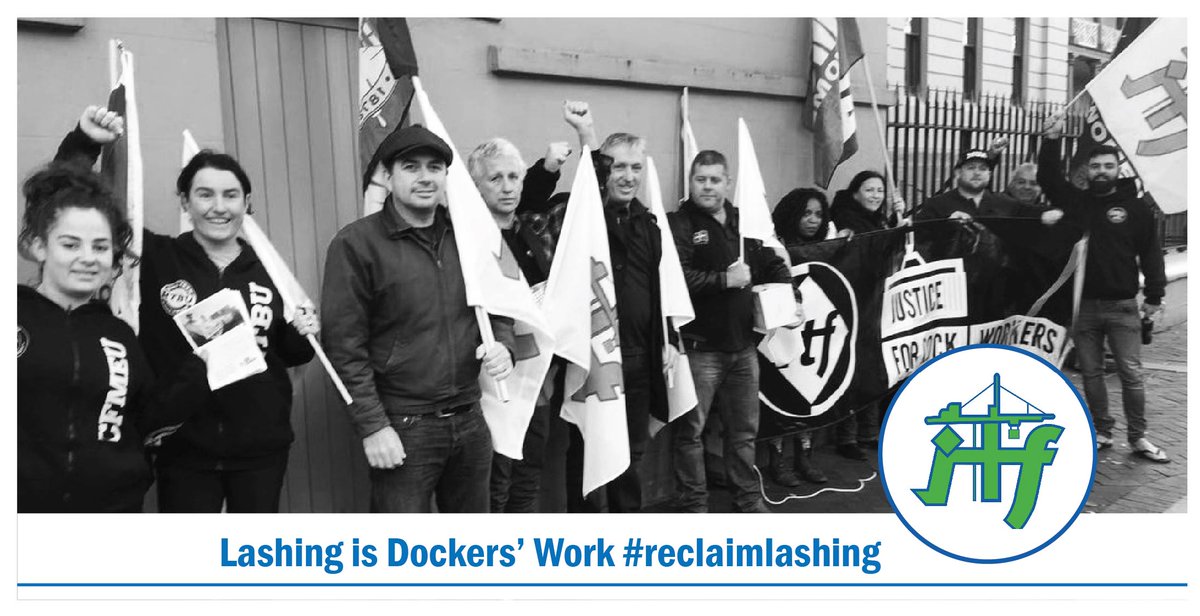31.1.2018 Germany: Northsea habours - SPD and Green fractions in the parliament of Hamburg (position as a federal state of the Federal Republic of Germany) which represent the majority of this parliament propose the decision: "Lashing is dockers work". The Parliament of Bremen took this decision in september 2017. The fight is going on in Niedersachsen (habour of Wilhelmshaven), last decision to take so that all german northsea habours protect the dockers work and the health of the seafarers.
Reclaiming lashing
Take action to protect dockers' lashing work in Europe
Lives are being put at risk and dockers are suffering because employers are still trying to force seafarers to carry out lashing and unlashing work.
As dockers know, securing of cargo is dangerous work and if it's carried out by untrained workers it can lead to injury or even death. Despite this the ITF is getting reports that this is happening because port operators believe they can speed up port operations and save money by not hiring port workers to do this job.
The ITF collective bargaining agreement article 3 clearly states that "lashing and unlashing of cargo is dockers' work and the crew should not be asked to undertake this work - unless there is prior agreement from the local ITF dockers' union". Companies, masters or officers asking seafarers to carry out lashing and unlashing work who don't have written permission are in breach of this contract.
If you're a docker: speak to your union about what you can do to support the Reclaim Lashing campaign where you are.
Stay up to date on the latest on the ITF dockers' Facebook page and by following the ITF on twitter @ITFglobalunion#ITFdockers
Download this Dutch leaflet for the next lashing workshop in Rotterdam.
If you're a seafarer: email details to ReclaimLashing@itf.org.uk if you're asked to do lashing or unlashing work in breach of an ITF contract. Include the vessel name and location, we won't tell your employer and will keep your details confidential.
Lashing campaign news
LASHING CAMPAIGN PROGRESSES - PORT REGULATION IS ADOPTED
FNV Havens holds its first Lashing Seminar
Dockers and their union leaders from ports across the Netherlands met in Rotterdam on Wednesday 18 January to launch a national lashing campaign in the framework of the ITF/ETF campaign to claim lashing. A packed seminar room committed to the objectives of the campaign, notably fighting politically, legally and industrially to ensure that in all ports lashing is done by Dockers. Participants also listened with interest to speakers including Terje Samuelsen-Fenn from NTF and Chair of the ETF Dockers’ Section, Torben Seebold from ver.di and Vice-Chair of both ETF and ITF Dockers’ Section, Niek Stam and Ed van der Hoek from FNV Havens, ITF Inspectors and ITF & ETF representatives. Participants worked on commencing plans to develop the campaign in the Netherlands and communicate closely with Dockers in other countries struggling with the same issue.
Niek Stam, leader of FNV Havens said: ”I am very happy with today’s event. There were some good ideas that came out of this workshop and things that we can get started on. The message to Dockers is: Let’s build strong networks in the terminals between lashers, dockers’ gangs and employers and let everyone know we are fighting for our jobs.”
More workshops are scheduled for the coming months in other European countries, notably Sweden, as unions make preparations for a strong and successful campaign. To find out more: www.reclaimlashing.org
ETF and ITF meet with Unifeeder
Following a well-attended demonstration at Unifeeder headquarters last December, representatives from 3F (Denmark), ver.di (Germany), ETF and ITF met with Unifeeder in Copenhagen.
At the end of the meeting Torben Seebold, vice-chair of the ETF and ITF Dockers’ Sections stated ‘We have exchanged our respective positions, which remain quite different. The impression we have is that Unifeeder’s main concern was to emphasise that as a charterer it has not direct contractual relation with the seafarers or with their unions, and that therefore other actors in the chain should be targeted by our campaign. For us, all involved parties have a role in pushing for cost reduction and, consequently, self-handling. For this reason, we are, first of all, seeking dialogue with each and every actor in the chain. He concluded by saying that ‘We have taken note of Unifeeder’s availability to engage in a possible dialogue that involves also other parties. In the meantime, we are pursuing our industrial and political campaign and are determined to achieve the results our members are asking for’.
Council of the EU adopts Port Regulation
On 23 January the Council of the EU adopted the Port Regulation, concluding a process that lasted for more than three-and-a-half years.
‘We take the opportunity of this final vote to reiterate our views on the regulation and on the EU port policy in general, which we expressed in December after the vote in the Parliament', stated ETF Dockers’ Section Chair Terje Samuelsen-Fenn. ‘In particular, we would like to support the statements delivered by Germany, Poland, Belgium, France and Italy before the vote, on the need to ensure coherence between the Regulation and other legal acts, in particular with the revision of the General Block Exemption Regulation (GBER)’ he concluded.
The vote by the Council was the last step of the legislative process. The Regulation will be signed by the Council and Parliament mid-February and published in the EU Official Journal a few weeks later. It will enter into force 20 days after its publication.




Comments
Post a Comment